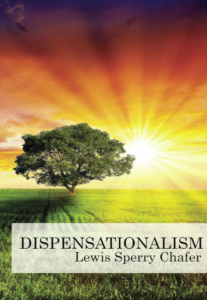
Author: Chafer, Lewis Sperry
Genre: Theology - Dispensationalism
Tags: Dispensationalism
Series:
Rick Shrader‘s Review:
Lewis Sperry Chafer (1871-1952) was co-founder of Dallas Theological Seminary, serving as President until his death. He was the key that brought dispensationalism from its historical roots of Darby and Scofield to its traditional form described mostly by Dallas men such as Charles Ryrie, John Walvoord, J. Dwight Pentecost, and also Alva J. McClain, founder of Grace Theological Seminary. I found this 1936 book somewhat revealing of Chafer’s views due to the multitude of current opinions about Chafer. It would actually be a good place for a seeker to begin his understanding of traditional dispensationalism. Two issues I was looking for that are attributed to Chafer are, the separation of Israel as an earthly people and the church as a heavenly people, and secondly, the view of two new covenants, one for Israel and one for the church. In this volume, Chafer simply refers to the church as a heavenly people in, what I would call, a positional way, i.e., that we are seated positionally in the heavenlies with Christ. Chafer does not go beyond that sense in this volume. Secondly, in this volume, Chafer does not present two new covenants. Rather, he seems to hold (at least in 1936) to a view that sees the church possessing some of the blessings of the new covenant. He writes, “When a parallel is drawn between the New Covenant now in force for the Church (Matt. 26:28) and the New Covenant yet to be made for Israel (Jer. 31:31-34), it is found that all that is promised Israel is now vouchsafed to the Church and that the range of blessing for the Church far exceeds the restricted provisions for Israel.” Though the intitial phrase seems to indicate two new covenants, the rest of the sentence does not. In fact, Chafer then follows by giving four things that the Church possesses in the new covenant now compared to four things that Israel will have in the future. For the church these are, 1) the indwelling Holy Spirit, 2) life in Christ, 3) a vital union with God, and 4) no condemnation in Christ (see page 87). Further writing by Chafer will show further explanation. The book can still be obtained in a reformatted printing.
